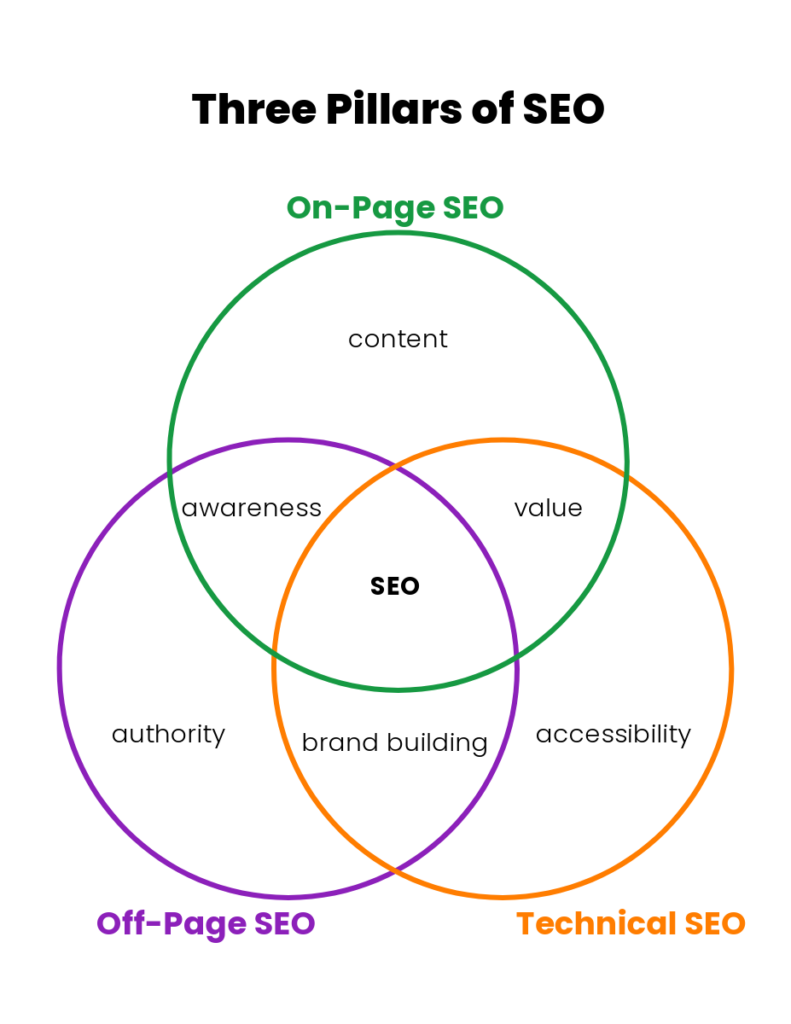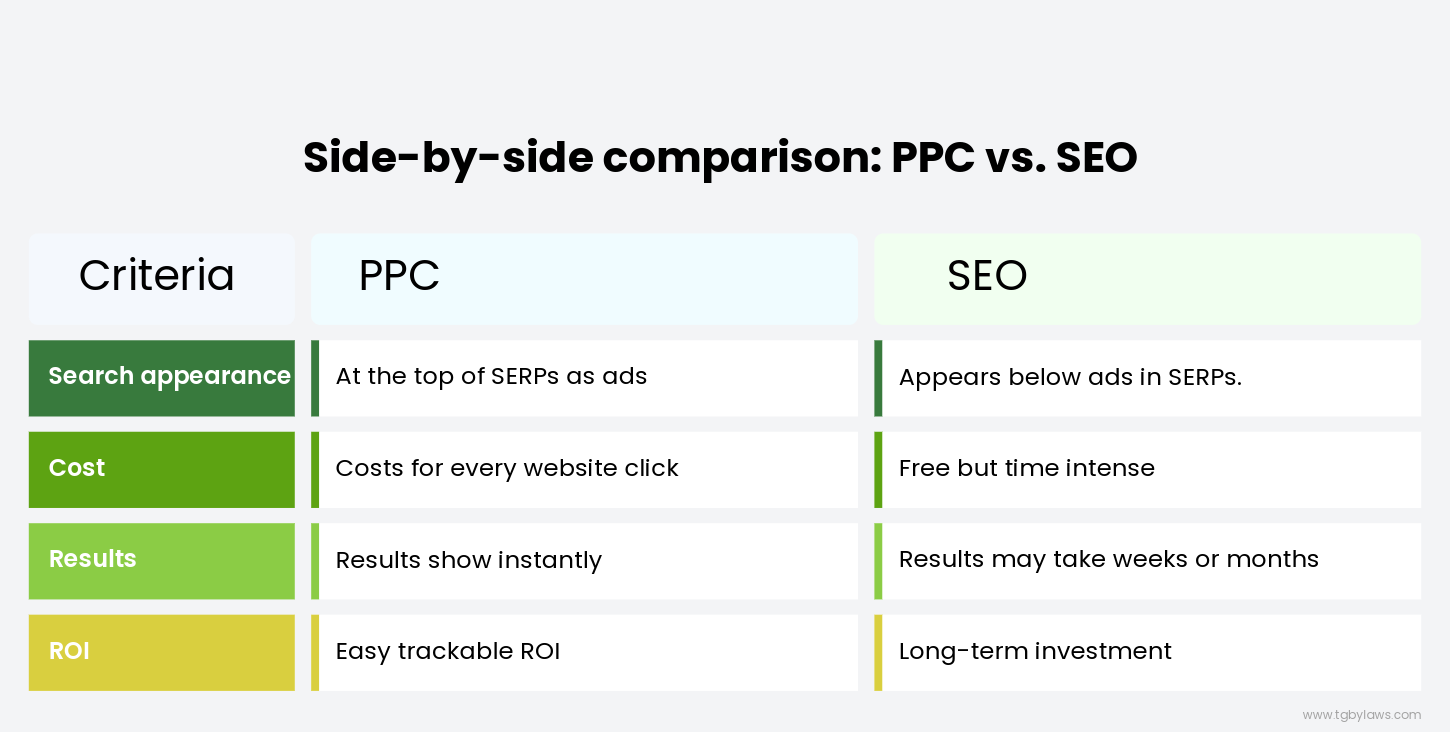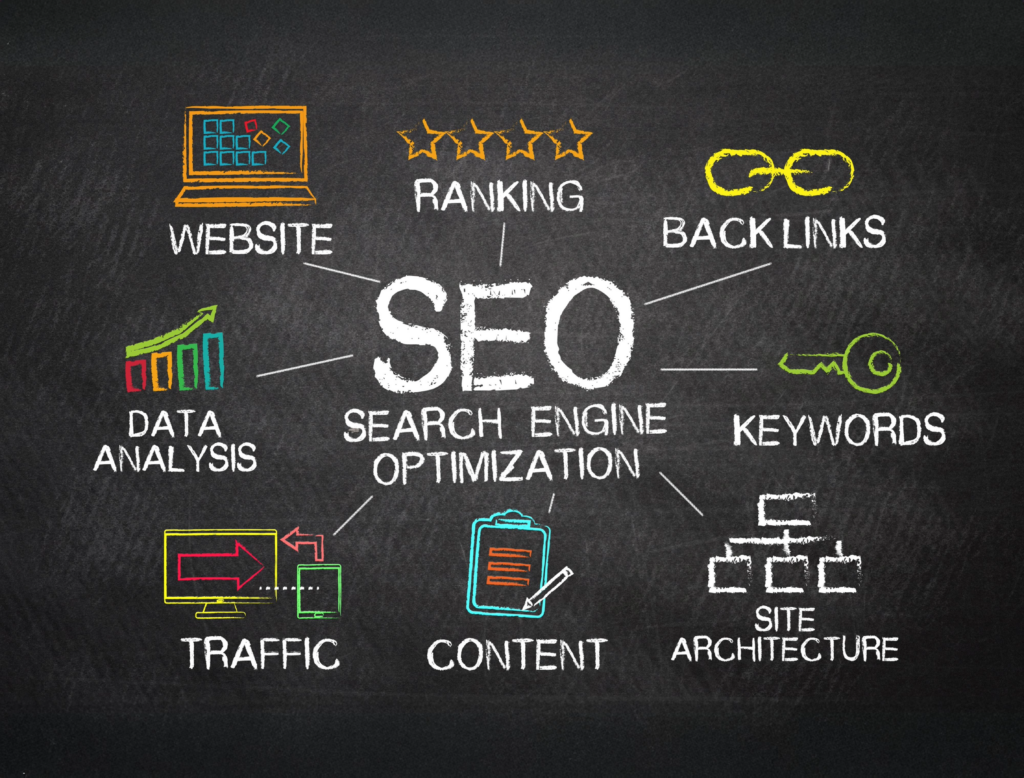SEO, or Search Engine Optimization, can sound like a complicated buzzword, but it’s really all about helping people find your website when they search online. Whether you’re just starting your SEO journey or want to polish your skills, this guide will walk you through the basics, explain how SEO works, and show you how AI and tools like automation can take it to the next level.
What is SEO?
SEO stands for Search Engine Optimization, and it’s the process of improving your website’s visibility in search engine results pages (SERPs). In simple terms, the better your SEO, the easier it is for people to find you on Google, Bing, or even platforms like YouTube and TikTok.
Think of SEO as a mix of three main areas:
- Technical Optimization: Fixing behind-the-scenes stuff like page speed and mobile-friendliness.
- On-Page-Optimization: Making your website’s content valuable and user-friendly.
- Off-Page-Optimization: Building your site’s authority through backlinks and other external signals.

Why SEO Matters
Did you know that organic search drives over 50% of all website traffic? That’s huge! SEO helps your site show up for the terms your audience is searching for—whether they’re looking for tips, products, or services.
And here’s the best part: SEO delivers long-term results. Unlike paid ads, where traffic stops when you stop paying, good SEO can keep bringing people to your site for months or even years.
- Drives Traffic: Organic search accounts for 53% of all website traffic.
- Builds Trust: High-ranking websites are seen as more reliable and trustworthy.
- Cost-Effective: Unlike paid ads, organic SEO doesn’t cost per click, making it a long-term investment.
- Better leads: You attract people looking for exactly what you offer.
The Three Pillars of SEO
1. Technical SEO
This involves the backend of your website. It’s about making sure your site is fast, mobile-friendly, and easy for search engines to crawl and index.
Key tips:
- Submit a sitemap to Google.
- Ensure your site is mobile-friendly.
- Speed up your page loading time using tools like Google PageSpeed Insights.
2. On-Page-SEO
On-page SEO focuses on optimizing content. You’ll use targeted keywords and create user-friendly content that matches search intent.
Key tips:
- Use relevant keywords naturally in your titles and headings.
- Write high-quality, helpful content that solves users’ problems.
- Add alt text to images so search engines understand them better.
3. Off-Page-SEO
Building authority is key here. This is achieved through high-quality backlinks from other reputable sites. The more trusted websites link to yours, the higher your credibility in search engines’ eyes.
Key tips:
- Get backlinks from reputable websites.
- Share your content on social media.
- Build relationships with influencers or bloggers in your niche.
Paid vs. Organic Search: What’s the Difference?
Paid search (like Google Ads) is when you pay to appear at the top of search results. It’s fast, but costs money for every click.
Organic search is free and relies on SEO to improve your ranking over time. It’s slower but more sustainable.
Organic Search (SEO):

- Cost: Free traffic, but requires time and effort.
- Time to See Results: Weeks or months.
- Longevity: Long-term benefits.
Paid Search (PPC):
- Cost: Pay-per-click (PPC) ads, with fees for every visitor.
- Time to See Results: Instant.
- Longevity: Stops as soon as your budget runs out.
How Search Engines Work: Crawling, Indexing, Ranking
Search engines like Google have three key steps:
- Crawling: Robots (also called “spiders”) discover new or updated pages.
- Indexing: Google stores and organizes the crawled content in its database.
- Ranking: Algorithms determine which pages appear in results based on over 200 factors related to relevance and quality.
Improving your SEO means optimizing for these steps so search engines rank your site higher.
The Role of AI in SEO
AI is transforming SEO by making keyword research, content creation, and even ranking predictions more efficient. Tools like Google’s Search Generative Experience (SGE) and ChatGPT can help businesses optimize faster and smarter.
Here’s how AI can help with your SEO efforts:
- Keyword Insights: Use tools like Ahrefs or Surfer SEO to find keywords that drive traffic.
- Content Generation: AI can help you draft blog posts, meta descriptions, and product pages quickly.
- Optimize for Search Intent: AI tools analyze user behavior, helping you match content to what people are really searching for.
- Streamline Local SEO: Automate tasks like managing local business listings or generating geo-targeted content.
- Predictive Analytics: They forecast ranking changes, allowing proactive adjustments.
How to Create an Effective SEO Strategy
- Set Clear Goals
Decide what you want to achieve, like increasing website traffic by 20% in six months. - Focus on Keywords
Use tools like Google Keyword Planner or Answer the Public to find what your audience is searching for. - Create Great Content
Write blog posts, product descriptions, or how-to guides that are engaging and helpful. - Track Your Progress
Measure metrics like page views, bounce rates, and lead generation using Google Analytics. - Stay Consistent
SEO takes time. Regular updates and improvements are key to long-term success.
FAQs About SEO for Your Business
Why Choose SEO?
Organic search drives 53% of all website traffic, making it a long-term investment compared to paid ads, which stop delivering results when you stop paying.
How Can AI Help with Website SEO?
Using AI for website SEO is like having a secret weapon. AI tools can help you optimize your site faster by suggesting keywords, analyzing competitor strategies, and generating content ideas. Plus, AI-powered platforms like seoClarity and Surfer SEO make it easier to improve page rankings and user experience.
What’s the Connection Between SEO and Website Optimization?
SEO and website optimization go hand-in-hand. While SEO focuses on improving search visibility, website optimization ensures your site is user-friendly and fast. Together, they create a seamless experience for visitors and increase your chances of converting them into leads.
How Can SEO Help Build Lead Generation Channels?
SEO drives organic traffic to your site, where you can capture leads through forms, newsletters, or calls-to-action. It’s an affordable and sustainable way to generate high-quality leads.
Can AI Automation Replace Manual Optimization?
Not entirely. AI and automation tools can speed up repetitive tasks like tracking rankings or generating reports. However, manual optimization is essential for personalized strategies and creative content that resonates with your audience.
Is SEO Worth It for Small Businesses?
Absolutely. Local SEO can make your business visible in your area, attracting customers searching for services nearby. Even small investments in SEO can lead to significant long-term benefits.
What SEO Objectives Should I Set?
Set objectives like:
- Moving 50% of your target keywords to the first page of Google.
- Increasing organic traffic by 20% over six months.
- Building brand authority with 10 new backlinks from high-domain websites.
How Can I Build Lead Generation Channels with SEO?
SEO is a powerful tool for generating leads. Here’s how to get started:
- Create Content for Each Stage of the Buyer’s Journey: Write blogs, guides, and landing pages tailored to awareness, consideration, and decision-making stages.
- Use Calls to Action (CTAs): Add clear CTAs like “Download Now” or “Contact Us” to capture leads.
- Optimize for Local Searches: Ensure your business is visible to local audiences through Google My Business and local keywords.
How Can Top Gear Bylaws Help My Business?
As a marketing and AI agency, Top Gear Bylaws specializes in:
- Building lead generation channels through Marketing campaigns utilizing paid and organic traffic.
- Implementing AI automation to streamline repetitive tasks.
- Creating tailored strategies to boost visibility and grow your audience.
Final Thoughts: Why SEO is Worth It
SEO is an essential tool for any business looking to grow online. While it takes time and effort, the benefits of better visibility, trust, and traffic are worth it. By combining SEO best practices with AI-powered tools and automation, you can create a powerful strategy that works for your business.
Need expert help?
Top Gear Bylaws is here to guide you with tailored SEO strategies and AI-driven solutions. Let’s work together to grow your brand!



